
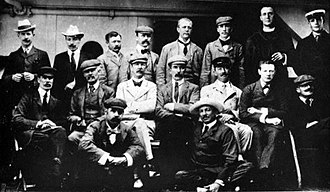
Major-General Sir Henry Edward Colvile, KCMG , CB (10 July 1852 – 25 November 1907) was an English soldier.


Major-General Sir Henry Edward Colvile, KCMG , CB (10 July 1852 – 25 November 1907) was an English soldier.
Colvile was born at Kirkby Hall, Leicestershire, the son of Charles Robert Colvile and Hon. Katherine Sarah Georgina Russell.
Colvile was educated at Eton, and entered the Grenadier Guards in 1870. He was appointed A.D.C. to General the Hon. Sir Leicester Smyth, commanding the forces in South Africa, in 1880. He served on the Intelligence Department of the Suakin Expedition of 1884, was present at the Battles of El Teb and the Battle of Tamai, mentioned in despatches, and received the bronze star, medal, and clasp. He was employed on special service in the Sudan prior to the Nile Expedition of 1884–85, and during that Expedition served as D.A.A.G. ; was mentioned in despatches ; received the clasp, and was created C.B. At the close of the Expedition he was Chief of the Intelligence Department of the Frontier Force ; was present at the Battle of Ginnis; was mentioned in despatches, and was promoted to the rank of colonel. He was then attached to the Intelligence Department at headquarters, and wrote the official history of the Sudan Campaign.
Colvile was the author of a plan, dated 1892, for a military expedition to Abeokuta. [2] However, a settlement was reached between the British and the Egba state without the use of military force. The plan is now held at Derbyshire Record Office among the Colvile family archives (collection D461).
In 1893 he succeeded the late Sir Gerald Portal as Commissioner (Acting) for Uganda, commanded the Unyoro Expedition, which resulted in the inclusion of that country into the Protectorate ; received the Central Africa Medal, was created Knight Commander of the Order of St Michael and St George (KCMG), and received the second-class Order of the Brilliant Star of Zanzibar. He was selected for promotion to the rank of major-general, 12 April 1898. [3]
Later, he became commander of the Infantry Brigade at Gibraltar in early 1899.
He served in the Second Boer War in South Africa 1899–1900. During the early part of the war he commanded the Guards Brigade, including during the Battle of Modder River in November 1899. He took part in the Battle of Magersfontein on 10–11 December 1899, in which the defending Boer force defeated the advancing British forces amongst heavy casualties for the latter. Colvile was mentioned in the despatch from Lord Methuen describing the battle. [4] The following year he was on 10 February 1900 appointed in command of the 9th Division, with the local rank of lieutenant-general whilst so employed. [5] [6] However, in May 1900, while Lord Roberts was closing in on Johannesburg, a Yeomanry battalion under Colvile's command was cut off and forced to surrender, Colvile was made a scapegoat and sent home. [7] He retired 1901.
Colvile married, firstly, Alice Rosa Daly, daughter of Hon. Robert Daly and Hon. Cecilia Maria A'Court, on 6 August 1878. He married, secondly, on 30 December 1886, Zélie Isabelle Richaud de Préville daughter of Pierre Richaud de Préville and Georgiana Anne Mowbray (1828–1896). Their son, Gilbert de Préville Colvile (1887–1966) who lived in Kenya married Diana Caldwell (1913–1987), later the third wife of Thomas Cholmondeley, 4th Baron Delamere.
Colvile died after his motorcycle collided with Henry Rawlinson, 1st Baron Rawlinson's car at Bisley.
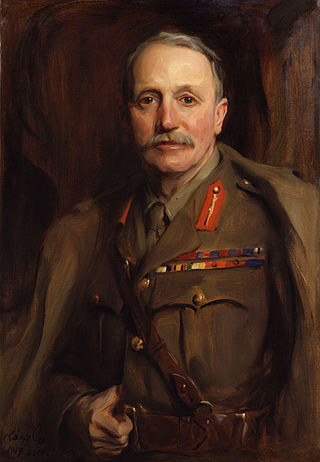
Lieutenant-General Sir William Pulteney Pulteney, was a British general during the First World War.
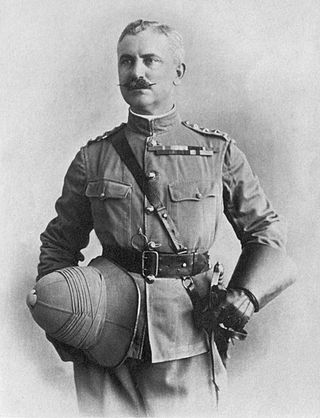
Sir Francis Reginald Wingate, 1st Baronet was a British general and administrator in Egypt and the Sudan. He earned the nom de guerre Wingate of the Sudan.

Lieutenant-General Sir Edward Thomas Henry Hutton, was a British military commander, who pioneered the use of mounted infantry in the British Army and later commanded the Canadian Militia and the Australian Army.

Lieutenant-General Robert George Broadwood, CB was a British Army general. A cavalry officer, Broadwood saw service in the Sudan, in the Second Boer War, and in the First World War. He was killed in action in 1917, while commanding the 57th Division, having earlier been accused of lacking "fighting spirit" for his refusal to sacrifice his troops in attacks he considered to be hopeless.

General Sir Charles Whittingham Horsley Douglas, was a British Army officer who served in the Second Anglo-Afghan War, the First Boer War, the Suakin Expedition, the Second Boer War and the First World War. He was Chief of the Imperial General Staff during the first three months of the First World War but died from strain and overwork without having any meaningful influence on the outcome of the war.

Major-General Andrew Gilbert Wauchope was a British Army officer who was killed while commanding a brigade at the Battle of Magersfontein during the Second Boer War.

Sir Bryan Thomas Mahon, was an Irish general of the British Army, a senator of the short-lived Senate of Southern Ireland, and a member for eight years of the Irish Free State Senate until his death.

Sir Edward Robert Prevost Woodgate was an infantry officer in the British Army.
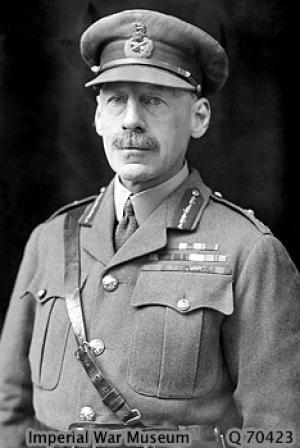
Lieutenant General Sir George Frederick Gorringe, served as an active field commander in the British Army during the Anglo-Boer War and the First World War, on the Palestine and Western Fronts.

Lieutenant-Colonel David Stanley William Ogilvy, 11th Earl of Airlie, was a Scottish peer and soldier.
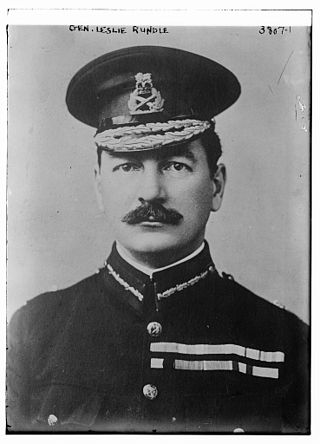
General Sir Henry Macleod Leslie Rundle, was a British Army general during the Second Boer War and the First World War.
Major General Beauchamp John Colclough Doran, was a British Army officer who served as a junior officer in the Second Boer War and later commanded an infantry brigade and division on the Western Front during the First World War.
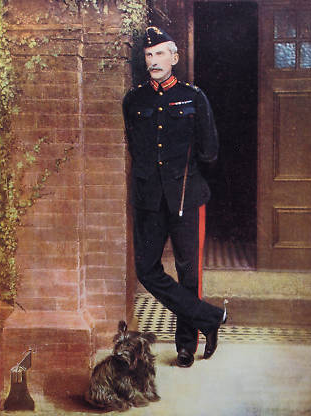
General Sir Henry John Thoroton Hildyard, was a British Army officer who saw active service in the Anglo-Egyptian War of 1882 and the Second Boer War. He was General Officer Commanding-in-Chief, South Africa, from 1905 to 1908.

Major-General Sir Alexander Nelson Rochfort, was a British Army officer who became Lieutenant Governor of Jersey.

Major-General Sir Cornelius Francis Clery, was a British Army officer who took part in the Anglo-Zulu War and later commanded the 2nd Division during the Second Boer War.

Major-General Sir Elliott Wood, was a British Army officer, who served in the Anglo-Egyptian War, the Sudan Campaign and the Second Boer War.
Surgeon-General Sir William Deane Wilson, was a British army surgeon, who was the principal medical officer of the British Army in South Africa during the Second Boer War from 1899 to 1902.
Brigadier-General John Townshend St Aubyn, 2nd Baron St Levan,, known as Hon. John Townshend St Aubyn from 1866 to 1908, was a British army officer and peer.
Lieutenant-General Sir Edward Altham Altham, was a British Army officer who served in the Second Boer War and as a senior intelligence officer during World War I. He was Quartermaster-General in India 1917–1919.

Major-General Sir Robert Pringle was Director-General of the Army Veterinary Service from 1910 to 1917.